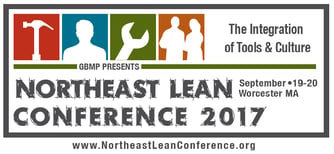With our annual Northeast LEAN Conference just a few days away, I want to relate a personal story about the theme of this year’s conference,
The Integration of Tools & Culture:
The first two books I ever read about Lean were Zero Inventories by Robert Hall and Japanese Manufacturing Techniques by Richard Schonberger. In 1985, these definitive academic works were among just a few sources of information about what was then referred to as Just-In-Time, or JIT for short. As I was just starting to manage a factory at that time with inventory turns of less than one (really), these JIT “how to” books seemed like the solution to my problems. I owe Hall and Schonberger a debt of gratitude for their early reports about technical aspects of Toyota’s incredible improvement system. But, for me, the single most important shred of information from these academic texts was a footnote in Hall’s book that referred to a then unknown industrialist by the name of Shigeo Shingo. Hall cited Shingo’s book, A Study of the Toyota Production System: From an Industrial Engineering Viewpoint. This book presented the technical aspects of Lean in a context of revolutionary concepts and principles. The original 1982 version was a crude translation from the Japanese, but reading it created a sense of excitement about a wholly new way of thinking about work. To be sure, Shingo’s explanation of tools echoed reports from Hall and Schonberger, but as one of the key inventors of TPS, Shingo shared a deep understanding that was grounded in unique personal experience and wisdom of a creator. While he is most often remembered for introducing technical concepts like quick changeover and mistake-proofing, Shingo’s greatest contribution to my learning was in providing an integrated image of TPS, a system that was both technical and social science – tools and culture. One could not exist without the other. Beyond that, he conveyed his personal struggles to overcome what he referred as “conceptual blind spots” of his clients, Toyota among them. He gave us the Law as well as the Gospel: Lean is an immense opportunity but equally a daunting challenge to rise above status quo thinking. “Keep an open mind,” he reminded us. According to Mr. Shingo, management’s #1 job was “volition,” i.e., a passionate commitment to creating an environment that favored improvement. These were lessons that supported my organization and me as we learned new tools and unlearned old concepts at the same time.
Today I’m often asked, “What do we work on first, tools or culture?” I answer, in context of the Toyota Production System, neither has substance without the other. They are two sides of the same coin. We need to learn them together. Our 2017 Northeast Lean Conference is dedicated to reinforcing that message. Lean tools are essential as means for improvement; Lean culture is essential to enable us to see beyond the status quo. If you haven’t already registered, here’s a link with more information:
http://www.northeastleanconference.org/about-ne-lean-2017.html
Hope we see you next week in Worcester, MA for a couple of energizing, informing and inspiring days.
O.L.D.


